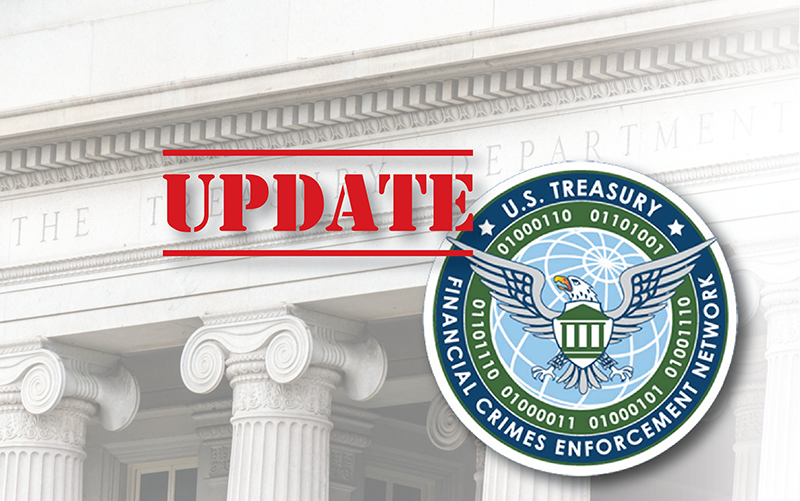Banking and Business Monthly – November 2020
IRS Issues Guidance on Employee Retention Credit and PPP Loans in M&A Transactions; Bank Regulators Issue a Joint Statement on Reference Rates for Loans
A. IRS Issues Guidance on Employee Retention Credit and PPP Loans in M&A Transactions
On November 16, 2020, the IRS added two new FAQs to its website to provide relief from the rules under the CARES Act that prevented an employer from claiming or keeping the employee retention credit (ERC) in the event that it acquired a target company that had taken a PPP loan under the CARES Act. Under the CARES Act, if an employer, defined as the aggregated group of commonly owned companies (using generally a 50-percent common ownership test), receives a PPP loan it may not also claim the ERC. This meant that if any member of the controlled group received a PPP loan, no member of the controlled group could take the ERC, even if the acquisition by the controlled group occurred after an entity received a PPP loan. More troubling, Section 2301(l)(3) of the CARES Act instructs the Treasury to promulgate regulations for the recapture of the ERC claimed by an employer that subsequently obtains a PPP loan. This caused concern that the acquirer could not only lose the ability to claim the ERC prospectively after the acquisition, but could be required to repay any ERC previously claimed. Although the two new FAQs are not binding on the IRS, they provide welcome guidance.
Stock Acquisitions
New FAQ 81a addresses the effect of acquiring an employer that obtained a PPP loan in a stock acquisition that requires the acquiring employer group and acquired employer to be aggregated for purposes of the ERC. The FAQ indicates that the effect of the transaction varies depending upon whether or not the PPP loan was fully satisfied or an escrow was established pre-transaction under the Small Business Administration (SBA) Procedural Notice from October 2.
If the target employer received a PPP loan but prior to closing either fully satisfied the loan or submitted a forgiveness application to the PPP lender and established an interest-bearing escrow account in accordance with the above SBA Procedural Notice, the entire employer group post-closing (including the acquired employer) may claim the ERC after the closing for qualified wages paid post-closing (assuming the other requirements for the credit are satisfied). In addition, no ERC claimed by the acquiring group is subject to recapture as a result of the acquisition.
If the target employer received a PPP loan but has not fully satisfied it or created the escrow account before closing, the acquiring employer group’s eligibility for the ERC is similarly not changed. However, in this case, the acquired employer would remain ineligible to claim the ERC in the post-closing period, just as it was before the transaction. In addition, any amount of ERC claimed by the acquiring group pre-transaction for qualified wages paid before the closing date are not subject to recapture.
Asset Acquisitions
New FAQ 81b addresses the effect of acquiring the assets of an employer who obtained a PPP loan. The effect differs depending upon whether or not the acquiring employer assumes the PPP loan liability. In neither case, however, is any amount of ERC claimed by the acquiring employer before the transaction subject to recapture. If the acquiring employer does not assume liability for the PPP loan, the transaction will have no effect on the acquiring employer’s eligibility for the ERC. Post-acquisition, the acquiring employer may claim the ERC (assuming the other requirements for the credit are satisfied) with respect to all employees, including those previously employed by the employer whose assets it acquired.
On the other hand, if the acquiring employer does assume liability for the PPP loan, it remains eligible for the ERC, but any wages paid by the acquiring employer to any individuals who worked for the target employer on the closing date will not be eligible for the ERC.
In sum, the FAQs will for the most part remove the potential loss of the ERC in mergers involving entities which received PPP loans.
B. Bank Regulators Issue a Joint Statement on Reference Rates for Loans
On November 6, 2020, the Board of Governors of the Federal Reserve System, the Office of the Comptroller of the Currency, and the Federal Deposit Insurance Corporation (Agencies) issued a joint Statement on Reference Rates for Loans (Joint Statement). The takeaway reminds me of the song “Closing Time” by Semisonic (“Closing time; You don't have to go home, but you can't stay here.”) because in it the Agencies are informing the banks they do not have to go to SOFR as the reference rate, but they cannot stay with LIBOR.
The Agencies want banks to “include fallback language in its lending contracts that provides for use of a robust fallback rate if the initial reference rate is discontinued.” New lending contracts “should either utilize a reference rate other than LIBOR or have robust fallback language that includes a clearly defined alternative reference rate after LIBOR’s discontinuation.” While the ARRC recommends SOFR, the Agencies said the use of SOFR is “voluntary” and they will not be making any particular recommendations for an alternative to LIBOR. The Agencies recognize a desire by some banks for a more credit-sensitive alternative to SOFR as a LIBOR replacement, because SOFR is a secured near-risk-free rate (the overnight rate for borrowing secured by U.S. Treasury securities) that does not represent a bank’s cost of funds. The Agencies said they are allowing banks freedom “to select suitable replacement rates for LIBOR that are most appropriate given their specific circumstances” which may include credit-sensitive alternatives.
If you have any questions about this article, please contact Steve at smigala@lavellelaw.com or 847-705-7555.
More News & Resources
Lavelle Law News and Events










STAY UP TO DATE
Subscribe to our newsletter
Lavelle Law, Ltd. | All Rights Reserved |
Created by Olive + Ash.
Managed by Olive Street Design.


